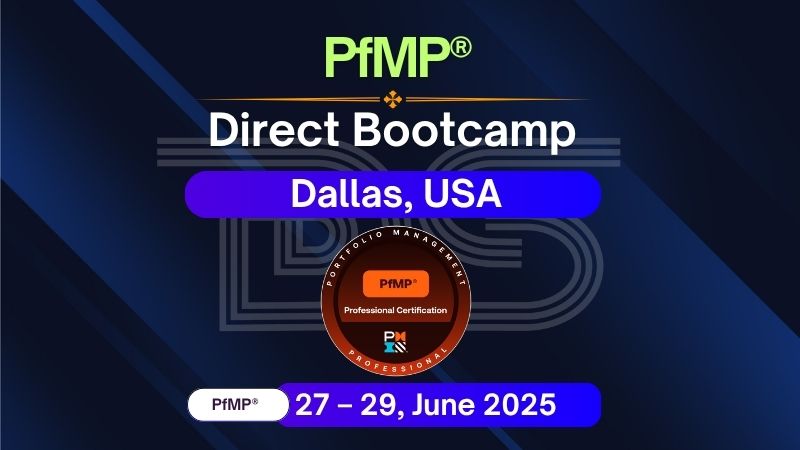
by DharamCW | May 3, 2025 | vCare PMI Certification Training Classes
🎯 Accelerate Your Portfolio Leadership Journey in Just 3 Days!
I’m excited to invite you to the PfMP Direct Bootcamp in Dallas — a focused, in-person experience designed to help you align portfolios with enterprise strategy and deliver true business value.
🌐 Register Now: https://bit.ly/3ByLdrs
📍 Location: Dallas
📅 Dates: 27–29 June 2025
🕘 Time: 9 AM – 5 PM (CDT)
As your trainer, I bring insights from guiding 175+ PfMPs worldwide, and together, we’ll dive deep into the portfolio management framework, decision-making, governance, and strategic execution.
🔍 What You’ll Receive:
✅ PfMP® Complete Reference Guide
✅ PfMP® Pathfinder: ECO Task Mapping
✅ PfMP® Mapping Workbook
✅ 48 PDUs / Contact Hours
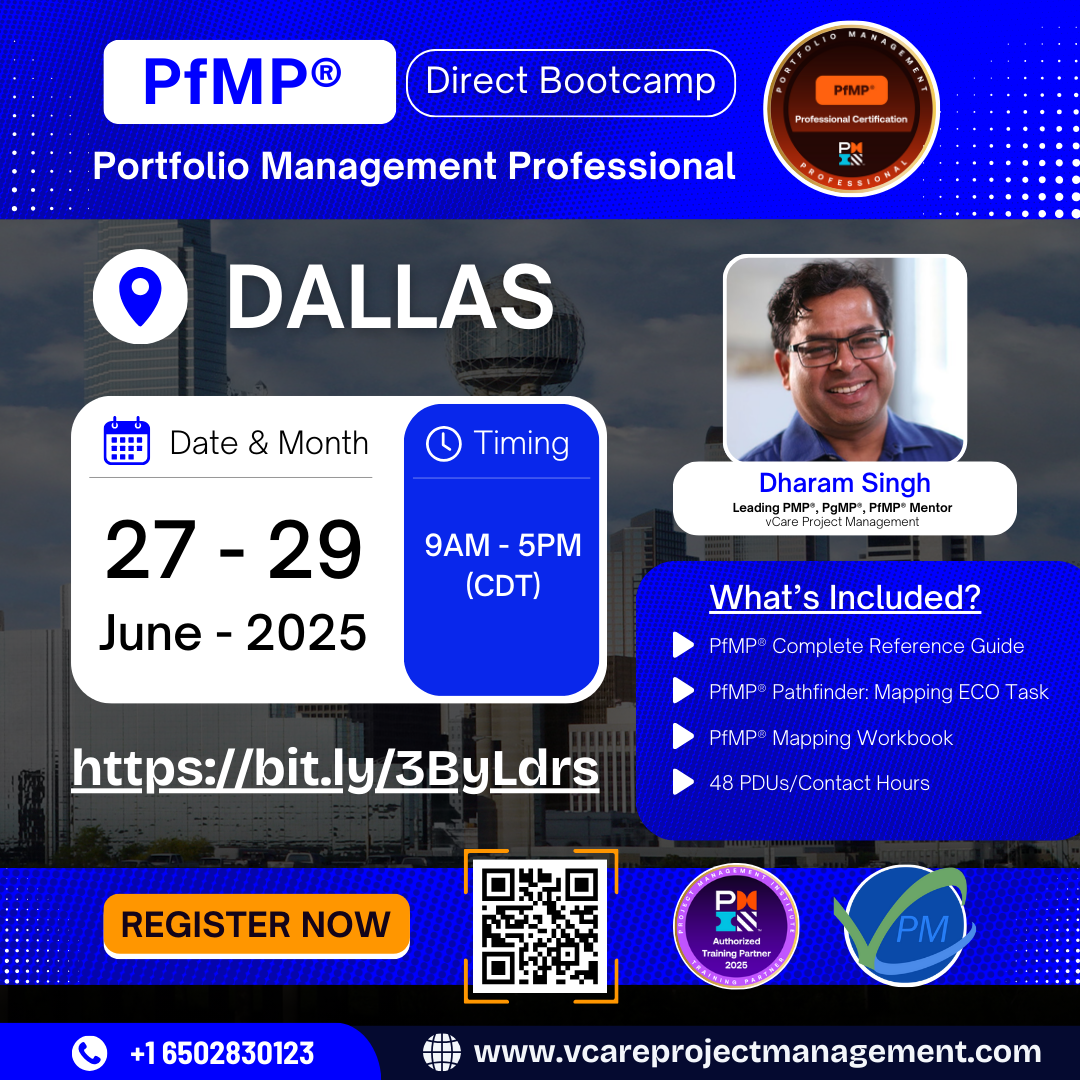
Accelerate your PfMP journey in 3 days—Join Dharam Singh in Dallas for expert-led portfolio leadership training
📌 Explore Our PfMP® Programs:
Online Training → http://bit.ly/39jOZSf
Direct Training → http://bit.ly/38er2M3
📌 Join Our PfMP® Community:
PfMP4U LinkedIn Group → http://bit.ly/31P7GKR
📌 Essential Resources for Your PfMP Exam Prep:
PfMP Challenger Gold (Mock Exams 1 to 3) | Exam Simulator – https://bit.ly/3KCjbNh
PfMP Challenger Mock Exam 1 | Exam Simulator – https://bit.ly/3KKZkv3
PfMP Pathfinder – https://bit.ly/35j9Dli
The Complete Reference Guide for PfMP Certification – https://bit.ly/3pU4ud5
🎯 Need guidance before deciding?
Let’s connect: http://talktodharam.com
📲 Register Now for Exclusive Offers
👉 Scan the QR or visit: https://lnkd.in/gPzhHvP5
📞 For queries: +1 650 283 0123
💥 Limited Seats – Reserve Early
This bootcamp is ideal for senior professionals ready to elevate their strategic leadership and portfolio management capability.
Let’s take your career to the next level – together.
#ProjectManagement #PgMP #PfMP #PMP #Agile #Leadership #StrategicThinking #DharamSingh #vCareProjectManagement #PMICertifications #PortfolioLeadership #PfMPBootcamp #DallasBootcamp #PfMPExamPrep #PortfolioManagement

by DharamCW | Apr 27, 2025 | Industry Trends and Insights, Leadership in Project Management
💡 Ever felt like you’re faking it, even while leading complex projects?
Impostor syndrome doesn’t spare even the most experienced managers—especially during high-stakes initiatives.
Here’s why:
🔹 MULTIFACETED ROLES INCREASE PRESSURE
High-stakes projects demand managers to juggle leadership, communication, and risk management roles, fostering self-doubt.
🔹 FAST-PACED, EVOLVING ENVIRONMENTS
Rapid changes in priorities and technologies amplify fears of falling behind.
🔹 PERFECTIONISM EXPECTATIONS
Striving for flawless execution leaves little room for error, fueling anxiety.
🔹 COMPLEX STAKEHOLDER DEMANDS
Balancing conflicting stakeholder needs often leads to second-guessing decisions.
🔹 CULTURAL AND GENDER DYNAMICS
Systemic biases and cultural expectations exacerbate self-doubt, especially for underrepresented groups.
💬 Which of these challenges resonate with you the most?
Let’s open up the conversation below.
View our upcoming PgMP® Programs
Online → http://bit.ly/2oBKQXQ
Direct → http://bit.ly/2oCfpg0
View our upcoming PfMP® Programs:
Online → http://bit.ly/39jOZSf
Direct → http://bit.ly/38er2M3
🎙️ Got questions about your Project Management career or PMI certifications?
Book your FREE 15-min session with me at 👉 www.talktodharam.com
📞 Contact Us
📱 Call: +1 650-283-0123
📧 Email: info@vcareprojectmanagement.com
🎧 Subscribe & Stay Ahead
Webinars & Success Stories: https://bit.ly/2YF0wJl
Podcasts & Interviews: https://bit.ly/2NDY8wd
#PgMP #PfMP #ProgramManagement #PortfolioManagement #Leadership #ImpostorSyndrome #vCareProjectManagement #DharamSingh #PMICertifications #ProjectLeadership #WomenInLeadership #CareerGrowth #SelfDoubt #HighStakesProjects #MindsetMatters
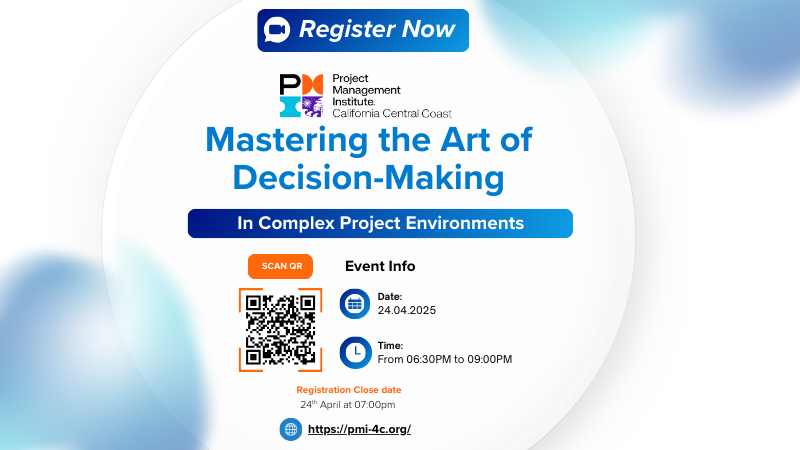
by DharamCW | Apr 22, 2025 | Industry Trends and Insights, Leadership in Project Management, Professional Development Webinars
🌐 Excited to be Speaking at PMI California Central Coast Chapter!
🎯 Topic: Mastering the Art of Decision-Making in Complex Project Environments
Date: 24th April 2025
Time: 6:30 PM to 9:00 PM PDT
📍 Register Now: https://pmi-4c.org/event-registration?eventId=41145
In today’s fast-changing project environments, the ability to make timely, informed, and strategic decisions is more vital than ever. I’m thrilled to join fellow professionals at PMI-4C to dive deep into the evolving landscape of project decision-making and explore the tools, trends, and tactics that drive better project outcomes.
💡 Key Agenda Points:
– Understanding the Decision-Making Landscape
– Tools & Techniques for Better Decisions
– Emerging Trends in 2025 & Beyond
– Stakeholder Engagement in Decision-Making
– Key Strategies for Future-Ready Organizations
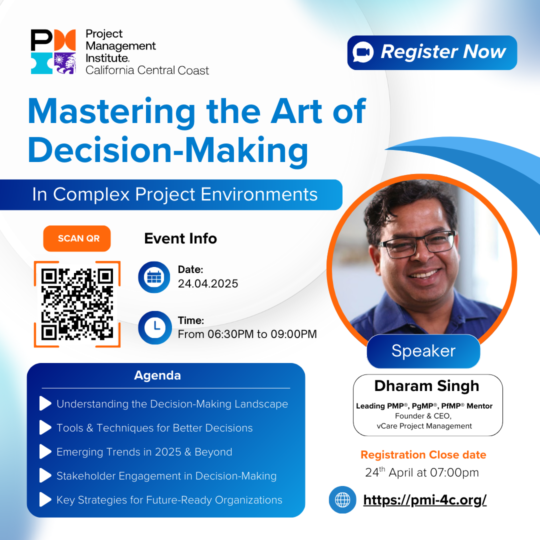
Dharam Singh to speak at PMI California Central Coast on mastering decision-making in complex project environments
📌 Whether you’re a project, program, or portfolio leader, this session will help sharpen your decision-making skills and better prepare your teams for complexity and change.
Let’s decode complexity and lead with clarity.
Looking forward to seeing you there!
View our upcoming PgMP® Programs
Online → http://bit.ly/2oBKQXQ
Direct → http://bit.ly/2oCfpg0
View our upcoming PfMP® Programs:
Online → http://bit.ly/39jOZSf
Direct → http://bit.ly/38er2M3
🎙️ Got questions about your Project Management career or PMI certifications?
Book your FREE 15-min session with me at 👉 www.talktodharam.com
📞 Contact Us
📱 Call: +1 650-283-0123 (U.S.)
📧 Email: info@vcareprojectmanagement.com
🎧 Subscribe & Stay Ahead
Webinars & Success Stories: https://bit.ly/2YF0wJl
Podcasts & Interviews: https://bit.ly/2NDY8wd
#ProjectManagement #DecisionMaking #Leadership #PgMP #PfMP #PMP #vCareProjectManagement #PMI4C #StrategicThinking #FutureReady #DharamSingh



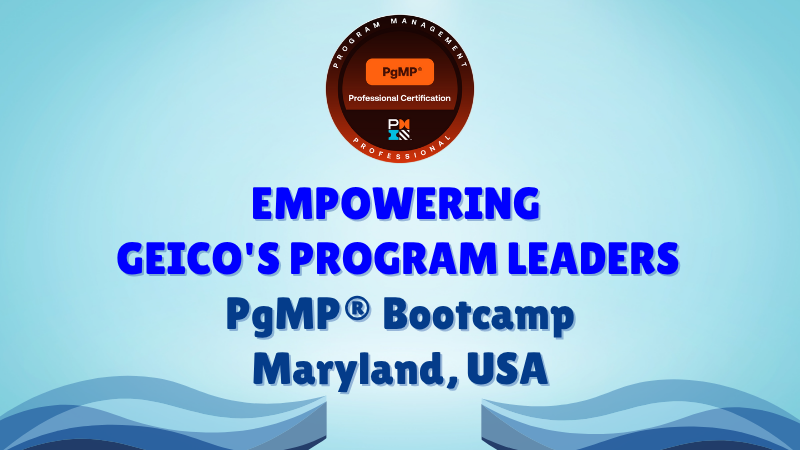
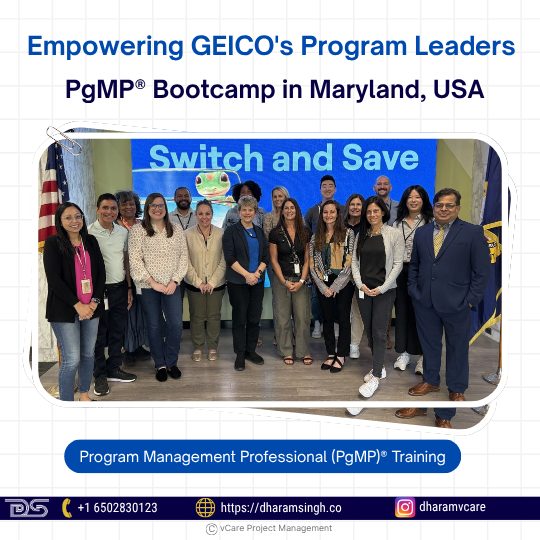
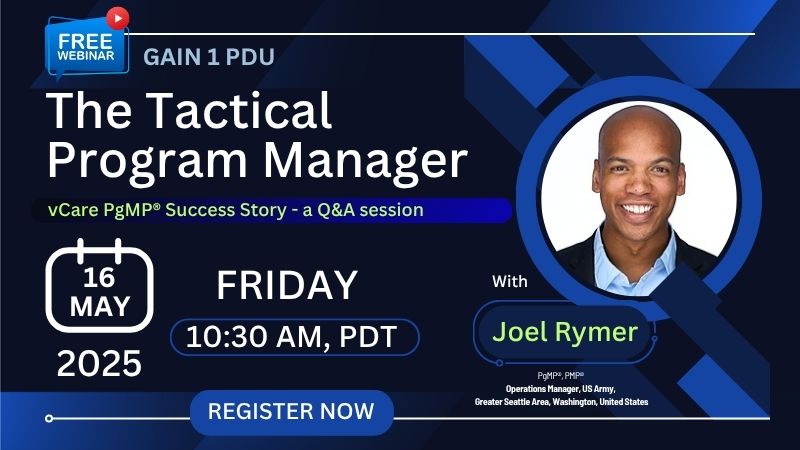




Are your program managers equipped to lead strategic transformations — or just managing projects?
At GEICO, we took this challenge head-on. And the results were nothing short of inspiring.
📍Location: GEICO Headquarters, Maryland, USA
💼 Event: PgMP® Bootcamp – Elevating Program Management Excellence
When Beatrice D. opened our session with a powerful vision — “You’re already great program managers, but the goal is to become Exceptional Program Managers” — she set the tone for an unforgettable learning experience.
Over three energizing days, I had the honor of mentoring 16 outstanding program managers at GEICO. We moved beyond theory — diving into real-world insights, challenging conversations, and practical strategies to lead enterprise-level programs with purpose and precision.
Their passion, discipline, and commitment to excellence were truly admirable. The gift of the GEICO mascots, the GECKOs — will always symbolize the relationships and results we built together.
🌟 To the GEICO team: Thank you for your trust and energy. The future is bright, and you’re ready for it. Special thanks to PMTraining for making this collaboration possible and for supporting organizations in upskilling their program management talent.